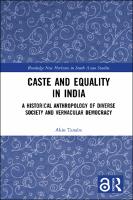Caste and Equality in India
Proposal review
A Historical Anthropology of Diverse Society and Vernacular Democracy
Abstract
This book presents an alternative view of caste in Indian society by analysing caste structure and change in local communities in Orissa from historical and anthropological perspectives. Focusing on the agricultural society in the Khurda district of Orissa between the eighteenth century and 2019, the book links discussions on the current transformation of society and politics in India with analyses of long-term historical transformations. The author suggests that, beyond status and power, there is another value which is important in Indian society, namely ontological equality, which functions as the politico-ethical ground for asserting respect and concern for the life of others. The book argues that the value of ontological equality has played an important role in creating and affirming the diverse society which characterises India. It further contends that the movement towards vernacular democracy, which has become conspicuous since the second half of the 1990s, is a historically groundbreaking event which opens a path beyond the postcolonial predicament, supported by the affirmation of diversity by subalterns based on the value of ontological equality. This important contribution to the study of Indian society will be of interest to academics working on the social, political and economic history, sociology, anthropology and political science of South Asia, as well as to those interested in social and political theory.
Keywords
caste; equality; IndiaDOI
10.4324/9781003173519ISBN
9781000409321, 9781003173519, 9781032002835, 9780367752286, 9781000409321Publisher
Taylor & FrancisPublisher website
https://taylorandfrancis.com/Publication date and place
2022Imprint
RoutledgeSeries
Routledge New Horizons in South Asian Studies,Classification
Ethnic studies
Regional / International studies


 Download
Download